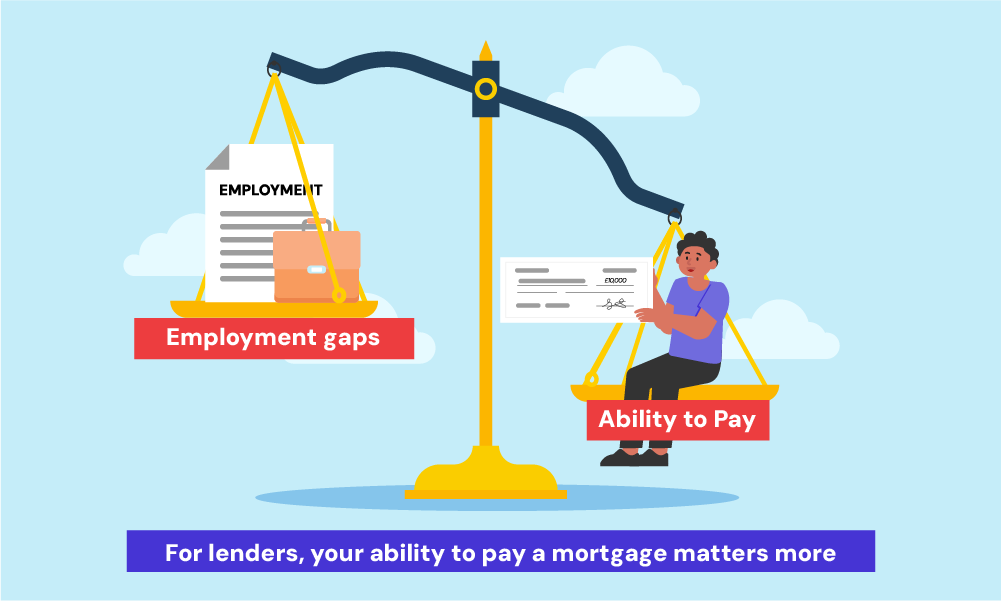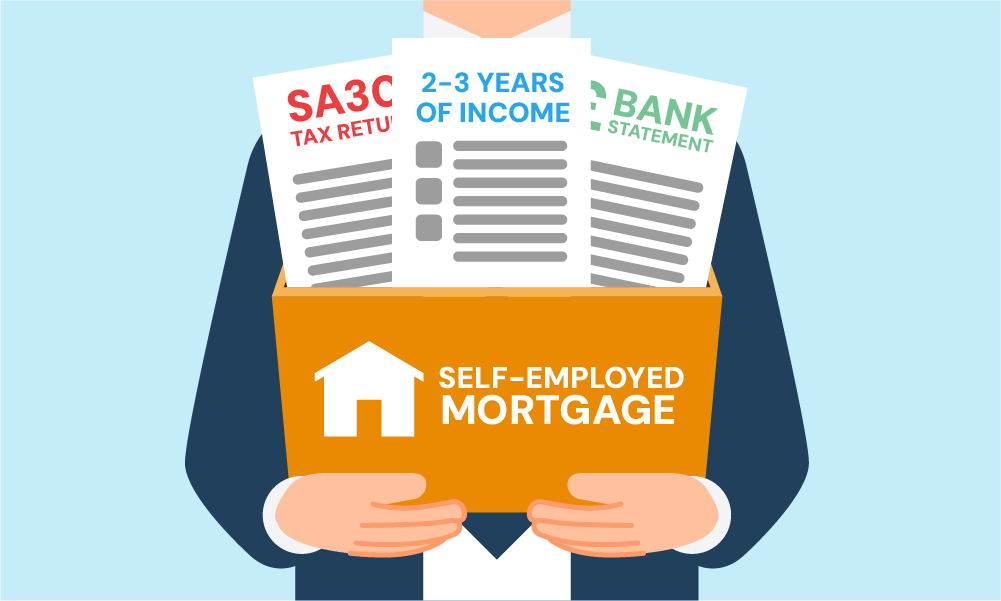- Can You Get a Mortgage with a Gap in Your Employment History?
- What’s Considered an Employment Gap?
- How Do Mortgage Lenders View Employment Gaps?
- What Reasons for Employment Gaps are Typically Accepted?
- Tips To Improve Your Chances of Mortgage Approval
- What if You’re Currently Between Jobs?
- How Does Self-Employment Affect Your Application?
- What About Furlough and the COVID-19 Pandemic?
- Should You Use a Mortgage Broker?
- Key Takeaways
- The Bottom Line
How To Get Mortgage Approval with Employment Gaps?

If you’re looking to buy a home in the UK, you might be wondering how a gap in your employment history could affect your mortgage application.
Here’s the thing: a break in your work record isn’t a disqualification. But it can make the process a bit more challenging.
Let’s dive into what you need to know about getting a mortgage with an employment gap.
Can You Get a Mortgage with a Gap in Your Employment History?
Yes, you can get a mortgage with a gap in your employment history. It’s not a deal-breaker.
Lenders consider your whole financial picture, not just your job history. They want to understand your financial health.
Here’s what helps your case:
- Be honest about the gap and explain the reason.
- Show proof of responsible finances during the gap, like savings, bill payments, or freelance work.
- Prove your income is stable now.
We’ll explore these points further below to help you understand about getting a mortgage with a gap.
What’s Considered an Employment Gap?
An employment gap is any period when you’re not working. This could be due to various reasons such as redundancy, taking time off to care for family, travelling, or returning to education.
Lenders typically consider gaps of 3 months or more as significant, but their views can vary.
For instance, a gap of:
- Less than one month: Usually overlooked
- 1 to 2 months: Generally not a concern
- 3 to 4 months: May require an explanation
- 5 to 6 months: Could raise questions
- 6 months or more: Likely to need a detailed explanation and supporting evidence
Remember, recent gaps are more likely to affect your application than those from several years ago.
How Do Mortgage Lenders View Employment Gaps?
Mortgage lenders are primarily concerned with your ability to make regular repayments. They use your employment history as an indicator of financial stability.
A consistent work record suggests a steady income, which is what lenders love to see.
But, lenders understand that life doesn’t always follow a straight path. They’ll consider the reasons behind your employment gap.
For example, if you took time off to gain extra qualifications that improve your career prospects, this could be viewed positively.

What Reasons for Employment Gaps are Typically Accepted?
Lenders often understand and accept gaps due to:
- Illness or injury
- Caring for a family member
- Redundancy (if you’ve since found new employment)
- Maternity or paternity leave
- Further education or training
- Travelling (especially if it’s enhanced your skills)
The key is to be prepared to explain your situation and provide supporting documentation where possible.
Tips To Improve Your Chances of Mortgage Approval
If you have an employment gap, don’t despair. Here’s how you can still get your mortgage approved:
- Be upfront about your employment history. Honesty matters. Lenders value transparency, so be open about any gaps in your work history.
- Provide a detailed explanation for any gaps. The more context you can give, the better. Whether it’s due to medical reasons, further education, or personal matters, a clear explanation helps lenders understand.
- Gather supporting documentation. Collect proof like medical records, educational certificates, or evidence of volunteering. These documents can justify your gap and strengthen your application
- Show financial responsibility during your gap. Demonstrate that you managed your finances well during your time off. Keeping up with bills and commitments shows lenders you can handle money responsibly.
- Maintain a good credit score. Essential, especially with employment gaps. Check your credit report regularly through Experian, Equifax, or TransUnion. Pay bills on time, keep credit utilisation low, and correct any errors on your report.
- Save for a larger deposit. A larger deposit makes you appear less risky to lenders. Try to save for a deposit of at least 10-20% if you can. This will help you get better mortgage rates and make your application more appealing.
- Consider a guarantor mortgage. If you’re struggling to get approved, having a guarantor might help. Choose someone with a strong financial background, ideally a parent or close relative. They should have a stable income and good credit history.
- Wait until you’ve been back at work for a while. Aim for at least six months of steady employment before applying. This shows stability and assures lenders of your income.
What if You’re Currently Between Jobs?
If you’re currently unemployed, getting a mortgage will be more challenging, but not impossible.
Some lenders may consider your application if:
- You have a job offer with a confirmed start date
- You have substantial savings or other assets
- You have a partner with a stable income (for joint applications)
- You’re returning to the same industry after a short break
In these cases, you’ll likely need to provide additional documentation and may face stricter lending criteria.
How Does Self-Employment Affect Your Application?
Being self-employed can affect your mortgage application.
Lenders typically look for 2-3 years of steady income proven by tax returns (including SA302 forms) and sometimes verified by an accountant.
Recent bank statements might also be required.
While some lenders may be stricter, others are more flexible, especially if you can show a history of contract renewals or consistent work.
Overall, demonstrating consistent income, good financial records, and a sound business plan will significantly improve your chances of getting a mortgage.

What About Furlough and the COVID-19 Pandemic?
The COVID-19 pandemic shook things up in the job market.
If you were furloughed, lenders will still consider you employed, but they’ll need proof. This means showing furlough letters from your boss and payslips with furlough payments.
Your P60 and P45 tax forms can also help confirm your employment during that time.
For the self-employed hit by the pandemic, lenders want to see how you coped.
They might ask for extra paperwork like bank statements, business accounts, and details of any government support you got, like grants from the Self-Employment Income Support Scheme (SEISS).
Show them your business is bouncing back or have a solid plan for future stability to boost your chances of getting a mortgage.
Lenders know about the pandemic and might be more flexible when assessing your application.
If you lose your job due to the pandemic, be prepared to explain it to lenders.
Many have adjusted their policies to be more flexible with these gaps. Proof you’re back at work or have a new job helps reassure them about your finances.
Should You Use a Mortgage Broker?
If you have gaps in your employment history, using a mortgage broker can be particularly beneficial.
They have in-depth knowledge of different lenders’ criteria and can guide you towards those most likely to accept your application. They can also help you present your situation in the best possible light.
Key Takeaways
- You can still get a mortgage with gaps in your employment history, but lenders will want to see a stable financial situation.
- Be honest about your employment gaps, and give a clear explanation with supporting documents.
- Lenders usually accept gaps due to illness, caring for family, redundancy, maternity/paternity leave, further education, or travelling.
- Maintain a good credit score, save for a larger deposit, and show stable employment for at least six months before applying to boost your chances.
- If self-employed, provide 2-3 years of steady income proof with tax returns and recent bank statements.
The Bottom Line
A gap in your work history can make getting a mortgage trickier, but it’s not a dealbreaker.
Be prepared to explain the situation clearly and honestly. Lenders care about your overall finances, not just your job history.

If you’re worried about a gap affecting your application, talk to a good mortgage advisor.
A good broker can give you personalised advice and guide you through the process. They’ll find lenders and products that fit your situation, saving you time and money.
Need a broker? We can connect you with a qualified one to help you get that mortgage. Simply, get in touch.
Get Matched With Your Dream Mortgage Advisor...

Frequently asked questions
Which lenders would approve my mortgage with a gap in employment?
Many UK lenders will consider a mortgage application with an employment gap.
Traditional banks and building societies may ask for more documentation to explain the gap and show financial responsibility.
Specialist lenders tend to be more flexible and understand unconventional work histories, focusing on your overall financial stability.
Can employment gaps hurt my chances of getting a joint mortgage?
Employment gaps can affect your chances of getting a joint mortgage, but they don’t necessarily prevent approval.
Lenders will assess both applicants’ employment histories and financial health. Providing a clear explanation and supporting documents for any gaps, along with showing current stable income, can help.
How long do I have to be in a job to get a mortgage in the UK?
Most UK lenders prefer applicants to have six months to a year of continuous employment with their current employer before applying for a mortgage.
This shows job stability and steady income. Some lenders may accept shorter employment durations if you have a strong financial profile.
Do I have to tell my mortgage lender if I change jobs in the UK?
Yes, you should inform your mortgage lender if you change jobs, especially before your mortgage application is approved. Changing jobs can affect your income stability, and lenders need this information to reassess your application.
Do mortgage lenders check with employers in the UK?
Yes, UK mortgage lenders often contact employers to verify job details, including your employment status, income, and length of employment.
This ensures the information in your application is accurate and helps lenders assess your ability to make mortgage payments.
This article has been fact checked
This article was created, checked, and verified by the expert team at Money Saving Guru. Trust us, you’re in good hands.




